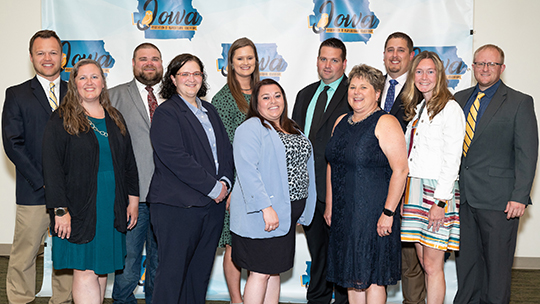About Iowa Association of Agricultural Educators (IAAE)
The IAAE is an organization for professional educators in agriculture at the secondary and postsecondary level in Iowa. The organization serves 385 instructors in 300 secondary and postsecondary agricultural education programs across Iowa. The IAAE vision is to be the premier organization for advancing agricultural education and their mission is to foster a network of professionals that values and supports the advancement of agricultural education. The Iowa Department of Education provides leadership and helps set direction for IAAE as a service to local agricultural, food, and natural resources (AFNR) programs.
 Board of Directors
Board of Directors
The IAAE Board of Directors made up of 16 members representing secondary education, postsecondary education, and teacher education in agriculture.
Organizational Goals
Deliver value for the membership.
Develop a network of professionals.
Foster development of articulated programs.
The Agricultural Education Mission
Agricultural Education prepares students for successful careers and a lifetime of informed choices in the global agriculture, food, fiber and natural resources systems.
The History of IAAE
In the late 1920’s, the forerunner of IAAE was born as an organization known as “Iowa Vocational Agriculture Teachers Club." Its purposes were for vocational agriculture (voc-ag) teachers to get to meet fellow voc-ag teachers, to share ideas, and discuss problems as agriculture programs were starting in Iowa schools.
In 1958 IVATA (Iowa Vocational Agriculture Teachers’ Association) was incorporated with the state of Iowa. In 1997 the name of the organization was changed to IAE (Iowa Agriculture Educators). In 1998 the name was changed to IAAE (Iowa Association of Agriculture Educators) to align with the verbiage of the national organization, the National Association of Agriculture Educators (NAAE).
In looking at the IAAE relationship to NAAE, there are many direct links in history. In 1928 at Philadelphia the NAVAT (National Association of Vocational Agriculture Teachers) was organized. Due to several reasons, NAVAT only was active 2 years.
In 1948 at Milwaukee during the AVA (American Vocational Association) Convention, a vocational teacher’s “Organization Study Committee” including Neil Johnston from Iowa, recommended that NVATA (National Vocational Agriculture Teachers’ Association) be organized. This was approved and NVATA began in 1948. Neil Johnston from Iowa was elected as Region III vice-president. In 1997 the name of the organization was changed by the voting delegates to NAAE (National Association of Agriculture Educators).
IAAE has unified membership. Agriculture Education Teachers are members of IAAE, NAAE, Iowa Association of Career and Technical Education (IACTE), and the American Association of Career and Technical Education (ACTE).
IAAE has had members serve at the national level many times in its history:
- Neil Johnston (Clarinda, Iowa) served on the “Organization Study committee” and was elected the first Region III Vice-President in 1948. The regional V-P’s serve 3 year terms.
- James Hamilton (Audubon, Iowa) was Region III Vice President from 1957-1960. He served as National President in 1961-62.
- Harold Crawford (Sac City, Iowa) was Region III Vice-President from 1963-1965.
- Duane Fisher (Mt. Auburn, Iowa) was Region III Vice-President from 1993-1996. He served as National President in 1997-98 including presiding over the 50th annual conference in New Orleans.
- Craig McEnany (Colo, Iowa-Instructor at DMACC in Ankeny) was Region III Vice-President from 2008-2011.
Narrative provided by Duane M. Fisher and submitted for the IAAE History Files on September 24, 2011.